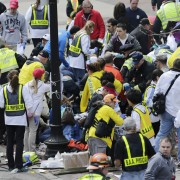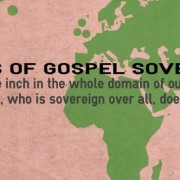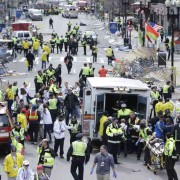Certain events are seared into our memories. I will never forget sitting in my elementary classroom as the space shuttle exploded after lift off. Or hearing the news of the towers falling on September 11, 2001. I’m not sure how you heard about the events in Boston on Monday. I was at my computer and saw someone post, “Praying for Boston.” This peaked my interest enough to Google “Boston.” All the top hits revealed the Boston Marathon was in progress. Strange. Well maybe not as I am friends with a bunch of athletes and just assumed that they were praying for friends running.
Then I saw “explosions rocks finish line” and my heart sank. Of course I was sickened as I felt like the war against terrorism had come to our shore; again. I know, its entirely too early to speculate who is responsible for this attack, but warrior spirit rose up within me wanting to defend and protect. We have to wait for the evidence to come in before we can identify who is responsible for this horrible act.
It’s far too early to start answering the many questions that surface from such a horrible attack, but I feel its appropriate to share how I have processed some of my questions.
Evil exists in the heart of humanity. I am limited in covering this subject in full, but in short, the Bible makes it clear that humanity is sinful. I am preaching through Romans right now and phrases like “There is none righteous, not even one”, “There is none who does good”, “Their feet are swift to shed blood”, “Destruction and misery are in their path” fill the first three chapters of this powerful book. The apostle Paul makes it clear that “all have sinned and fall short of the glory of God” (Rom. 3:23). As individuals, we are warned of the wrath of God and are encouraged to turn to Christ for life and security.
This may seem obvious, but we must recognize and understand that evil exists in our world when events like this occur. Our culture seems to have difficulty admitting that evil does exist for one reason or another.
The role of government as revealed in Scripture. Our government does a lot for us. In fact, almost all political debates revolve around how much, or little, should the government do for the citizens. As I have scoured the Scriptures, I see one, quite possibly the only, command given towards authorities like our government. This command is presented clearly in Romans 13:4, “It is a minister of God, an avenger who brings wrath on the one who practices evil.” This short sentence concisely identifies the problem and how it is to be dealt with. Evil is the problem and the government has a responsibility to inflict the wrath of God on the one who does evil. Bringing about justice to the individual, or individuals, behind this act of terrorism should be the top priority of our government.
How are we to respond to such events? I’m not sure if this is the proper order, but this is the order of responses that come to my mind.
My first thought is thankfulness for the work God has done in my own heart through Christ. I recognize my capacity for anger, rage, and evil. I can’t help but to think, “But by the grace go I.” I totally believe it’s okay to have a little righteous anger, but in that I realize if it wasn’t for the grace of God restraining me I could have been responsible for some evil act.
Second, I am so thankful for my life and family. I thank God that my family is safe. How many accidents has He protected me from that I was unaware? I’m reminded of the shortness of life. I need to appreciate each moment as a gift. I think this is what Solomon meant when he wrote, “It is better to go to a house of mourning than to go to a house of feasting” (Ecc. 7:2).
Third, my heart and prayers go to the victims of this which are many—from those killed, the injured, their families, and the first responders both volunteers and professionals who first responded to the victims and to the scene of the crime.
Fourth, I pray for our leaders in charge of us as Paul commands (1 Tim. 2:1-2). I pray that they would have wisdom, discernment, and courage as they stand against evil. They have many difficult decisions to make as they protect those they have been entrusted to protect.
Fifth, I pray for those that “bear the sword” (Rom. 13:4). There are men and women who have been tasked to bring about justice. I am thankful for the sheep dogs who are willing to place their personal safety second to the safety of the general population. The weight of this responsibility on them and their families is hard to describe. I am thankful for them and pray for them as they carry out this great responsibility.
Finally, I cry out “maranatha” which Paul writes in 1 Corinthian 16:22 and means “Our Lord, come!” Ultimately He is the one who will restore order in this world. I realize that He is our only hope. We need His help and should cry out to Him.






